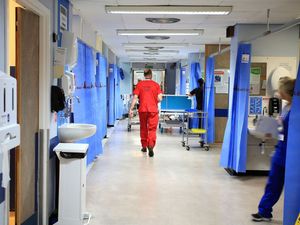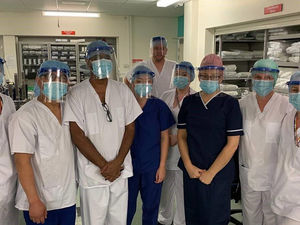Almost 180,000 patients waiting for routine treatment at Black Country hospitals as more than 40,000 join in a year
The number of patients waiting for routine treatment at Black Country hospitals has rocketed by more than 41,500 in a single year, new figures show.

Almost 180,000 patients at trusts running hospitals in Wolverhampton, Walsall, Dudley and Sandwell were on waiting lists for non-urgent elective operations or procedures at the end of March.
NHS England figures show that number had risen from the month before at Walsall Healthcare NHS Trust, The Dudley Group NHS Foundation Trust and The Royal Wolverhampton NHS Trust, with Sandwell and West Birmingham Hospitals NHS Trust showing a slight fall.
It comes as hospitals have had to grapple with staff absences and the pressures caused by the pandemic.
At the Wolverhampton trust, 58,996 patients were waiting for routine treatment at the end of March – up from 57,603 in February, and 44,140 in March 2021.
More than 1,300 patients had joined waiting lists at the Dudley trust in March, compared to the previous month, and the figure had grown by 12,274 to reach 34,372 in a year.
At the Walsall trust, the number rose from 20,940 in March 2021 to 29,382 in a year.
And at Sandwell and West Birmingham Hospitals NHS Trust, the number stood at 56,193 patients in March, rising by more than 6,000 in the space of 12 months.
Siva Anandaciva, chief analyst at The King’s Fund think tank, said that unless the Government “grasp the nettle” on health and social care staffing shortages, patients will be left waiting in “discomfort, pain and deteriorating health”.
He added: “The top priority for the NHS is to tackle the longest waits, so it is some comfort to see the number of people waiting over two years for planned care starting to come down.
“The Queen’s Speech identified reducing the backlog of care as one of the Government’s top three priorities.
“But the reality check is that until ministers grasp the nettle on health and care staffing shortages, it will be patients who continue to pay the price by waiting longer in discomfort, pain and deteriorating health.”
Nationally, 6.4 million people were waiting to start treatment at the end of March – the highest number since records began in 2007.
The Department of Health and Social Care said it has provided a record £36 billion over the next three years for the NHS and social care, and launched a plan to tackle the Covid backlog.
A spokesman added: “We recognise the unprecedented pressure NHS staff are under from the pandemic – especially frontline ambulance workers."





